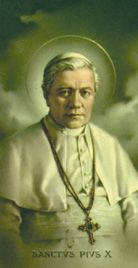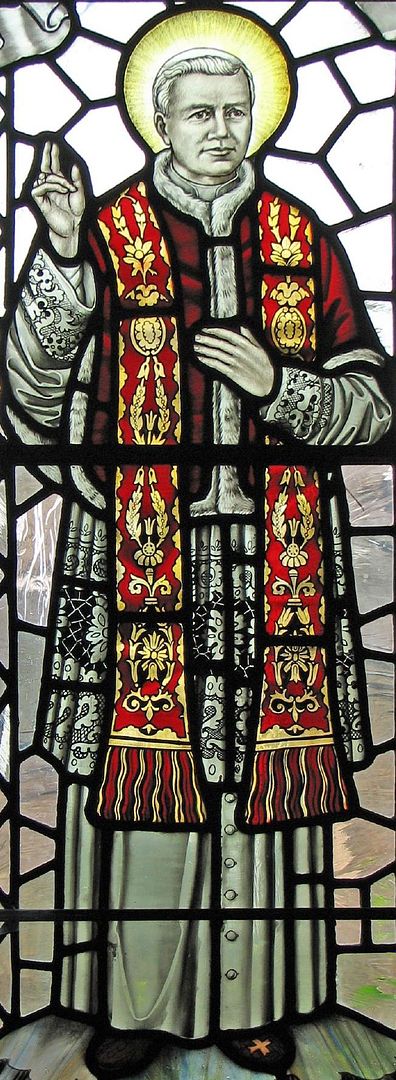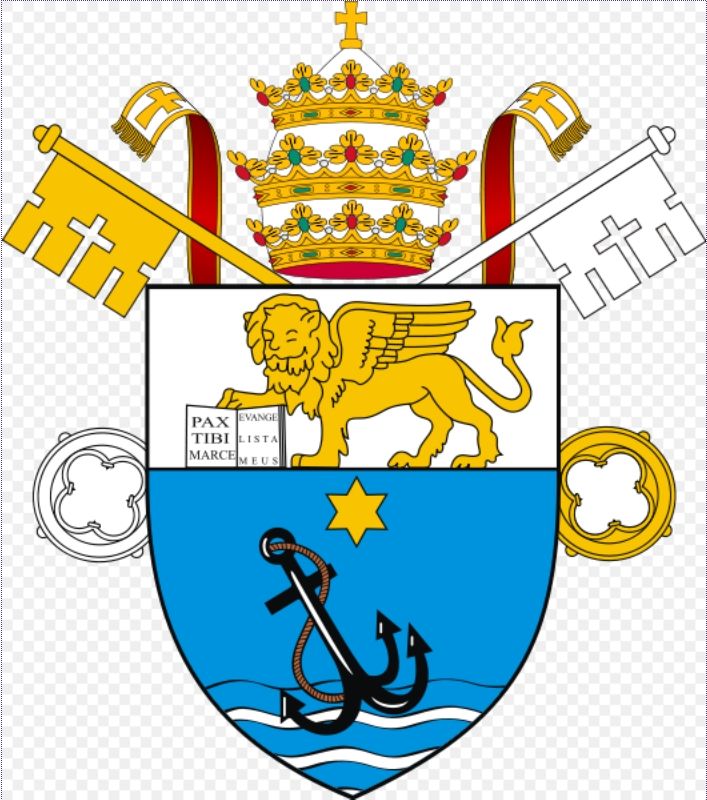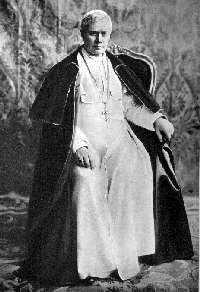“Holy Communion is the shortest and safest way to Heaven.”
Today, August 21, we celebrate the feast day of Pope Saint Pius X (1835-1914), Confessor, reformer, and the two hundred-fifty-ninth pope. Referred to as the “Pope of the Blessed Sacrament,” Pope Pius X is perhaps remembered best for his encouragement of frequent reception of the Holy Eucharist, especially for children. He urged all Catholics to look to Our Blessed Mother, and to “Restore all things in Christ” for the betterment of personal lives and of the world—a world plunged into war during his papacy. Throughout his life, Pope Pius X never forgot his humble beginnings, and lived a life of poverty, service, and humility. His last will and testament proclaims this sentiment: "I was born poor, I have lived in poverty, and I wish to die poor."
A contemporary of this great holy man, Baron von Pastor, stated of him: "He was one of those chosen few men whose personality is irresistible. Everyone was moved by his simplicity and his angelic kindness. Yet it was something more that carried him into all hearts: and that 'something' is best defined by saying that all who were ever admitted to his presence had a deep conviction of being face to face with a saint.”
Born Giuseppe Melchiorre Sarto in the small village of Reise, Venetia, the future pope experienced poverty and demonstrated humility from an early age. Giuseppe’s father was the town postman and with his mother, the couple struggled to financially support ten children. Despite their poverty, both parents highly valued education, and rather than working, Giuseppe walked six kilometers to school each day to receive his education.
As a child, Giuseppe demonstrated aptitude for learning and devotion to the Lord. He studied Latin with a local priest, and through his hard work, secured himself a scholarship to attend Seminary in Padua—something his family could not have afforded. Ordained at the age of twenty-three, he served as curate, and then labored for 17 years as a parish priest. As a priest, Giuseppe sought to prefect his knowledge of theology by assiduously studying Saint Thomas and canon law. At the same time he established a night school for adult students, and devoted himself of the ministry of preaching in other towns to which he was called. Giuseppe was elected bishop of Mantua, and in 1892 was advanced to Cardinal, and appointed to the metropolitan see of Venice with the honorary title of Patriarch. Noted for his keen intelligence, diligent work, and great piety, he was sought out for prestigious positions and advanced rapidly. Through all of his work, Giuseppe obediently answered the call of the Lord, never seeking election or promotion, but accepting that which was thrust upon him.
Giuseppe was elected Pope in 1903, taking the name Pius X, described as "a man of God who knew the unhappiness of the world and the hardships of life, and in the greatness of his heart wanted to comfort everybody." The primary goal and aim of his papacy was to “Renew all things in Christ” ("instaurare omnia in Christo"). He preached frequent reception of Holy Eucharist, a restoration of church music—including Gregorian Chant, encouraged daily Bible reading and renewal and reform of institutions to teach Biblical matters, reorganized the Roman ecclesiastical offices, and codified Canon Law—all in attempts to draw the faithful to Christ and renew the Church in His presence.
As Pope and spiritual director of the Church on earth, he displayed untiring self-sacrifice and great energy. Above all things, he defended the purity of Christian doctrine. He realized to the full the value of the liturgy as the prayer of the Church and the solid basis that it furnishes for the devotion of Christian people. He promoted sacred music so that the congregation may better participate in holy prayer, and had choir books printed for the congregation. Above all, his holiness shone forth conspicuously. From Pius X we learn again that "the folly of the Cross", simplicity of life, and humility of heart are still the highest wisdom and the indispensable conditions of a perfect Christian life, for they are the very source of all apostolic fruitfulness.
On the eleventh anniversary of his election as pope, Europe was thrust into the first World War. Taking ill with bronchitis, he wrote, “This is the last affliction the Lord will visit on me. I would gladly give my life to save my poor children from this ghastly scourge.” Pope Saint Pius X died a few days later, on August 20, 1914. His sanctity and power to work miracles had already been recognized. He was the first Pope canonized since Saint Pius V in 1672.
Selected Quotations of Pope Saint Pius X:
“Truly we are passing through disastrous times, when we may well make our own the lamentation of the Prophet: “There is no truth, and there is no mercy, and there is no knowledge of God in the land” (Hosea 4:1). Yet in the midst of this tide of evil, the Virgin Most Merciful rises before our eyes like a rainbow, as the arbiter of peace between God and man.”
“God could have given us the Redeemer of the human race, and the Founder of the Faiths in another way than through the Virgin, but since Divine Providence has been pleased that we should have the Man-God through Mary, who conceived Him by the Holy Spirit and bore Him in her womb, it only remains for us to receive Christ from the hands of Mary.”
“Sanctity alone makes us what our divine vocation demands, men crucified to the world and to whom the world has been crucified, men walking in newness of life who, in the words of St. Paul, show themselves as ministers of God in labors, in vigils, in fasting, in chastity, in knowledge, in long-suffering, in kindness, in the Holy Spirit, in sincere charity, in the word of truth; men who seek only heavenly things and strive by every means to lead others to them.”
“My hope is in Christ, who strengthens the weakest by His Divine help. I can do all in Him who strengthens me. His Power is infinite, and if I lean on him, it will be mine. His Wisdom is infinite, and if I look to Him for counsel, I shall not be deceived. His Goodness is infinite, and if my trust is stayed in Him, I shall not be abandoned.”
“Let the storm rage and the sky darken – not for that shall we be dismayed. If we trust as we should in Mary, we shall recognize in her, the Virgin Most Powerful “who with virginal foot did crush the head of the serpent.”
“The collection of psalms found in Scripture, composed as it was under divine inspiration, has, from the very beginnings of the Church, shown a wonderful power of fostering devotion among Christians as they offer “to God a continuous sacrifice of praise, the harvest of lips blessing his name.” Following a custom already established in the Old Law, the psalms have played a conspicuous part in the sacred liturgy itself, and in the divine office. Augustine expresses this well when he says: “God praised himself so that man might give him fitting praise; because God chose to praise himself man found the way in which to bless God.” The psalms have also a wonderful power to awaken in our hearts the desire for every virtue. Athanasius says: “The psalms seem to me to be like a mirror, in which the person using them can see himself, and the stirrings of his own heart; he can recite them against the background of his own emotions.” Augustine says in his Confessions: “How I wept when I heard you hymns and canticles, being deeply moved by the sweet singing of your Church. Those voices flowed into my ears, truth filtered into my heart, and from my heart surged waves of devotion.” Indeed, who could fail to be moved by those many passages in the psalms which set forth so profoundly the infinite majesty of God, his omnipotence, his justice and goodness and clemency, too deep for words, and all the other infinite qualities of his that deserve our praise? Who could fail to be roused to the same emotions by the prayers of thanksgiving to God for blessings received by the petitions, so humble and confident, for blessings still awaited, by the cries of a soul in sorrow for sin committed? Who would not be fired with love as he looks on the likeness of Christ, the redeemer, here so lovingly foretold? His was “the voice” Augustine heard in every psalm, the voice of praise, of suffering, of joyful expectation, of present distress.”
From AD DIEM ILLUM LAETISSIMUM (On the Immaculate Conception), Papal Encyclical:
10. For is not Mary the Mother of Christ? Then she is our Mother also. And we must in truth hold that Christ, the Word made Flesh, is also the Savior of mankind. He had a physical body like that of any other man: and again as Savior of the human family, he had a spiritual and mystical body, the society, namely, of those who believe in Christ. "We are many, but one sole body in Christ" (Rom. xii., 5). Now the Blessed Virgin did not conceive the Eternal Son of God merely in order that He might be made man taking His human nature from her, but also in order that by means of the nature assumed from her He might be the Redeemer of men. For which reason the Angel said to the Shepherds: "To-day there is born to you a Savior who is Christ the Lord" (Luke ii., 11). Wherefore in the same holy bosom of his most chaste Mother Christ took to Himself flesh, and united to Himself the spiritual body formed by those who were to believe in Him. Hence Mary, carrying the Savior within her, may be said to have also carried all those whose life was contained in the life of the Savior. Therefore all we who are united to Christ, and as the Apostle says are members of His body, of His flesh, and of His bones (Ephes. v., 30), have issued from the womb of Mary like a body united to its head. Hence, though in a spiritual and mystical fashion, we are all children of Mary, and she is Mother of us all. Mother, spiritually indeed, but truly Mother of the members of Christ, who are we (S. Aug. L. de S. Virginitate, c. 6).
11. If then the most Blessed Virgin is the Mother at once of God and men, who can doubt that she will work with all diligence to procure that Christ, Head of the Body of the Church (Coloss. i., 18), may transfuse His gifts into us, His members, and above all that of knowing Him and living through Him (I John iv., 9)?
12. Moreover it was not only the prerogative of the Most Holy Mother to have furnished the material of His flesh to the Only Son of God, Who was to be born with human members (S. Bede Ven. L. Iv. in Luc. xl.), of which material should be prepared the Victim for the salvation of men; but hers was also the office of tending and nourishing that Victim, and at the appointed time presenting Him for the sacrifice. Hence that uninterrupted community of life and labors of the Son and the Mother, so that of both might have been uttered the words of the Psalmist “My life is consumed in sorrow and my years in groans" (Ps xxx., 11). When the supreme hour of the Son came, beside the Cross of Jesus there stood Mary His Mother, not merely occupied in contemplating the cruel spectacle, but rejoicing that her Only Son was offered for the salvation of mankind, and so entirely participating in His Passion, that if it had been possible she would have gladly borne all the torments that her Son bore (S. Bonav. 1. Sent d. 48, ad Litt. dub. 4). And from this community of will and suffering between Christ and Mary she merited to become most worthily the Reparatrix of the lost world (Eadmeri Mon. De Excellentia Virg. Mariae, c. 9) and Dispensatrix of all the gifts that Our Savior purchased for us by His Death and by His Blood.
13. It cannot, of course, be denied that the dispensation of these treasures is the particular and peculiar right of Jesus Christ, for they are the exclusive fruit of His Death, who by His nature is the mediator between God and man. Nevertheless, by this companionship in sorrow and suffering already mentioned between the Mother and the Son, it has been allowed to the august Virgin to be the most powerful mediatrix and advocate of the whole world with her Divine Son (Pius IX. Ineffabilis). The source, then, is Jesus Christ "of whose fullness we have all received" (John i., 16), "from whom the whole body, being compacted and fitly joined together by what every joint supplieth, according to the operation in the measure of every part, maketh increase of the body unto the edifying of itself in charity" (Ephesians iv., 16). But Mary, as St. Bernard justly remarks, is the channel (Serm. de temp on the Nativ. B. V. De Aquaeductu n. 4); or, if you will, the connecting portion the function of which is to join the body to the head and to transmit to the body the influences and volitions of the head - We mean the neck. Yes, says St. Bernardine of Sienna, "she is the neck of Our Head, by which He communicates to His mystical body all spiritual gifts" (Quadrag. de Evangel. aetern. Serm. x., a. 3, c. iii.).
14. We are then, it will be seen, very far from attributing to the Mother of God a productive power of grace - a power which belongs to God alone. Yet, since Mary carries it over all in holiness and union with Jesus Christ, and has been associated by Jesus Christ in the work of redemption, she merits for us de congruo, in the language of theologians, what Jesus Christ merits for us de condigno, and she is the supreme Minister of the distribution of graces. Jesus "sitteth on the right hand of the majesty on high" (Hebrews i. b.). Mary sitteth at the right hand of her Son - a refuge so secure and a help so trusty against all dangers that we have nothing to fear or to despair of under her guidance, her patronage, her protection. (Pius IX. in Bull Ineffabilis).
Glorious Pope of the Eucharist, Saint Pius X, you sought "to restore all things in Christ." Obtain for me a true love of Jesus so that I may live only for Him. Help me to acquire a lively fervor and a sincere will to strive for sanctity of life, and that I may avail myself of the riches of the Holy Eucharist in sacrifice and sacrament. By your love for Mary, mother and queen of all, inflame my heart with tender devotion to her.
Blessed model of the priesthood, obtain for us holy, dedicated priests, and increase vocations to the religious life. Dispel confusion and hatred and anxiety, and incline our hearts to peace and concord. so that all nations will place themselves under the sweet reign of Christ. Amen.
Saint Pius X, pray for me.
Father,
to defend the Catholic faith
and to make all things new in Christ,
You filled St. Pius X
with heavenly wisdom and apostolic courage.
May his example and teaching
lead us to the reward of eternal life.
Grant this through our Lord Jesus Christ, Your Son,
who lives and reigns with You and the Holy Spirit,
one God, for ever and ever. Amen.
Year 2: Day 232 of 365
Prayer Intentions: Yearning for the Lord.
Requested Intentions: Restoration of health (J); Restoration of health (S); Freedom from pride (A); For children and marriage (M); For the birth of a healthy baby (Y); For personal family intentions, for the sick, poor, hungry, and homeless (G); Financial security and peace (J); Grace, peace, and obedience to the will of God in a marriage (H); Successful and blessed marriage for sin, freedom from anxiety for husband, spiritual contentedness for family (N); Employment and health for a husband (B); Recovery and health of a mother (J); For a family to grow closer to the Church, salvation for all children (D); Successful employment (L); Successful employment (S); Renewal of faith life (A); Support for an intended marriage, health for friend and aunt (J); Mental health assistance for son (G); Freedom from illness (S); Successful employment (C); Financial assistance and employment (B); For a family’s intentions (T); Successful examination results (B); Healing of a friend with cancer, for all those who help others (B); Healing and love (L); Grace and healing (V); Healing of a heart, consecration of a marriage (M); Health of a family, intentions of apostolate (H); For repentance (J); For a family in trouble (R); Healing, successful relationships for son, financial success (J); Success of a company (L); For a religious society (J); Healing of a husband, strength as a faithful caregiver (D); Healing of a son (T); Financial security, Healing and guidance (M); Healing of a heart and relationship (V); Employment for daughter (J); For a marriage that glorifies the Lord (K); Resolution of family situation, parents’ health (A); Positive results (C); For a son’s employment, faith, and relationships (S).



















He's the best!
ReplyDelete